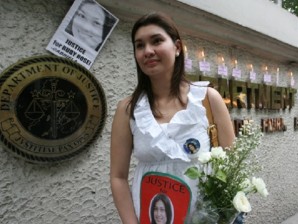MANILA, Philippines — The family of the slain Ruby Rose Barrameda is bent on filing an appeal to stop the transfer of the sensational case to a judge it said might not be “as partial and fair” as the previous one.
In an interview, actress Rochelle Barrameda-Labarda, the victim’s sister, told the Philippine Daily Inquirer that she and her family would “definitely” resort to a legal remedy to ensure that the decision of the Court of Appeals to raffle off the case to another judge would not push through.
As to what legal remedy this was, Barrameda-Labarda said that it could be a motion for reconsideration, but that this would still depend on the outcome of her meeting with her lawyer and prosecutors from the Office of the Solicitor General on Thursday.
Lawyer Franklin Sunga, Barrameda-Labarda’s counsel, told the Inquirer that they also had the option of elevating the case to the Supreme Court.
“We are worried that whoever will take (Judge Zaldy Docena’s) place will be easily influenced. We have seen (Docena’s) fairness. At first, we were really scared when he (took over) but he showed he has principles,” the former beauty queen said.
Asked if they would also appeal the court’s refusal to allow Manuel Montero, one of the accused, to turn state witness, Barrameda-Labarda replied in the affirmative.
She said that this was because she was concerned that their case against Manuel Jimenez Jr. and his other co-accused would be “weakened” if Montero’s discharge from the list of accused did not push through.
Sunga agreed. He refused to elaborate, however, when asked why this was so.
“(All I can say is) it is difficult to prosecute (if Montero is not allowed to turn state witness). Just read between the lines,” he said.
On May 22, members of the appellate court’s tenth division said that there was basis for the allegation of partiality against Judge Docena of Malabon Regional Trial Court Branch 170.
At the same time, the court ruled that Montero should not be allowed to turn state witness, since his situation did not comply with four of the five conditions set forth by the Rules of Criminal Procedure.
These are that there be absolute necessity for his testimony, that there be no other direct evidence available for the proper prosecution of the offense committed except for his testimony, that his testimony be substantially corroborated, and lastly, that he not appear as the most guilty in the commission of the crime.
Montero has reportedly complied with the fifth condition: that the accused seeking to be discharged to be a state witness should not have been convicted at any time of “any offense involving moral turpitude.”
